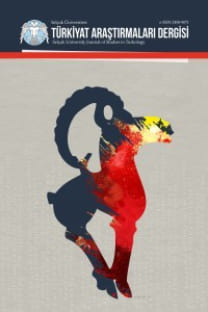TARİH VE KÜLTÜREL İLETİŞİM EKSENİNDE NAZEMİN M. GELEN’İN HASAN BULLİLER ROMANINI YENİDEN YORUMLAMAK
Hasan Bulliler, tarihî roman, Kıbrıs, İngiliz Sömürge Yönetimi, kültür, kültürel iletişim
REINTERPRETING THE “HASAN BULLİLER” NOVEL OF NAZEMİN M. GELEN IN THE CONTEXT OF HISTORY AND CULTURAL COMMUNICATION
Hasan Bullis, historical novel, Cyprus, British Colonial Administration, culture, cultural communication,
___
- AKTAŞ, Şerif, (2000), Roman Sanatı ve Roman İncelemesine Giriş, Ankara: Akçağ Yayınları.
- BOZKURT, İsmail, (2001), “Ethnic Perspective In Epics: The Case Of Hasan Bulliler”, Electronic Journal of Folklore, Sayı 16: 96-104. (https://www.folklore.ee/folklore/vol16/bulliler.pdf)
- ÇOBANOĞLU, Özkul, (2012), “Kıbrıs Türk Halk Kültüründe Halk Kahramanı Kalıbı ve Sosyo-Psikolojik İşlevleri”, Millî Folklor, 11 (41): 29-35. (http://www.millifolklor.com/Yayin/41)
- DEMİRDAĞ, Refika Altıkulaç, (2016), “Köy Romanlarında Eşkıyalık ve Kahraman Olma Arzusu”, Turkish Studies International Periodical for the Languages, Literature and History of Turkish or Turkic, 11 (15): 31-49. (http://www.turkishstudies.net/OncekiSayilarDetay.aspx?Sayi=Volume%2011%20Issue%2015)
- GELEN, Nazemin M., (1980), Bir Devrin Efsane Kahramanları Hasanbulliler, Lefkoşa: Halkın Sesi Ofset.
- KAREKLAS M.B.E., M. Ch., (2001), Hasan Bulliler’in Suç Faaliyetleri, (çev: Mehmet Demiryürek), Lefkoşa: Işık Kitabevi Yayınları.
- KÜLAHLIOĞLU İSLAM, Ayşenur, (2004), “Kuruluştan Kurtuluşa, Dört Tarihi Roman”, Türkbilig, Sayı 8: 108-123. (http://www.turkbilig.com/icerik.asp?sayi=200408)
- ÖZDEMİR, Metin, (2015), “İslam’ın Barış Dini Olmasının Kur’anî Temelleri”, International Journal of Science Culture and Sport, Özel Sayı 4: 72-80. (http://www.iscsjournal.com/OncekiSayilarDetay.aspx?Sayi=12)
- SAĞLAM, Feyyaz, (1988), “Bir Devrin Efsane Kahramanları Hasan Bulliler”, Yeni Kıbrıs Dergisi, 35-39.
- ŞİMŞEK, Ahmet, (2006), “Tarihsel Romanın Eğitimsel İşlevi”, Bilig, Sayı 37: 65-80. (http://bilig.yesevi.edu.tr/yonetim/kcfinder/upload/files/bilig-37-bahar-2006.pdf)
- TOPRAK, Zafer - vd. (1997), İnkılap Tarihi Dersleri Nasıl Okutulmalı, İstanbul: Sarmal Yayınları.
- YILDIRIM, Ali - ŞİMŞEK, Hasan, (2013), Nitel Araştırma Yöntemleri, Ankara: Seçkin Yayıncılık, 9. bs.
- YORGANCIOĞLU, Oğuz, (2000), Kıbrıs Türk Folkloru, Magosa.
- ISSN: 1300-5766
- Yayın Aralığı: Yılda 3 Sayı
- Başlangıç: 1994
- Yayıncı: Selçuk Üniversitesi
EDEBİ METİNLERDE AĞIZ KULLANIMI: BEKİR YILDIZ ÖRNEĞİ
TARİH VE KÜLTÜREL İLETİŞİM EKSENİNDE NAZEMİN M. GELEN’İN HASAN BULLİLER ROMANINI YENİDEN YORUMLAMAK
Mustafa YENİASIR, Burak GÖKBULUT
HASAN RIZÂYÎ’NİN CÛY-I RAHMET ADLI MANZUM GÜLİSTÂN ŞERHİNDE AYET VE HADİS İKTİBASLARI
d>c SES DEĞİŞİMİNE KASTAMONU AĞZINDAN ÖRNEKLER
KAÇAR VE OSMANLI DEVLETLERİ ARASINDA BELİRSİZ SINIR MESELELERİ
d>c SES DEĞİŞİMİNE KASTAMONU AĞZINDAN ÖRNEKLER
AZERBAYCAN’DA OKUTULAN ATA YURDU DERS KİTABINDA AZERBAYCAN ULUSAL KİMLİĞİNİN TEMSİLİ
BİR DİL SÜRÇMESİ TÜRÜ OLARAK ÇAPRAZLAMA VE TÜRKÇE ÖRNEKLER BAĞLAMINDA YAPISAL ÖZELLİKLERİ
Yakup KARASOY, Orhan YAVUZ, İbrahim YILMAZ
CUMHURİYET ARŞİVİ BELGELERİNE GÖRE CUMHURİYETİN İLK YILLARINDA TÜRKİYE-İSVEÇ İLİŞKİLERİ
